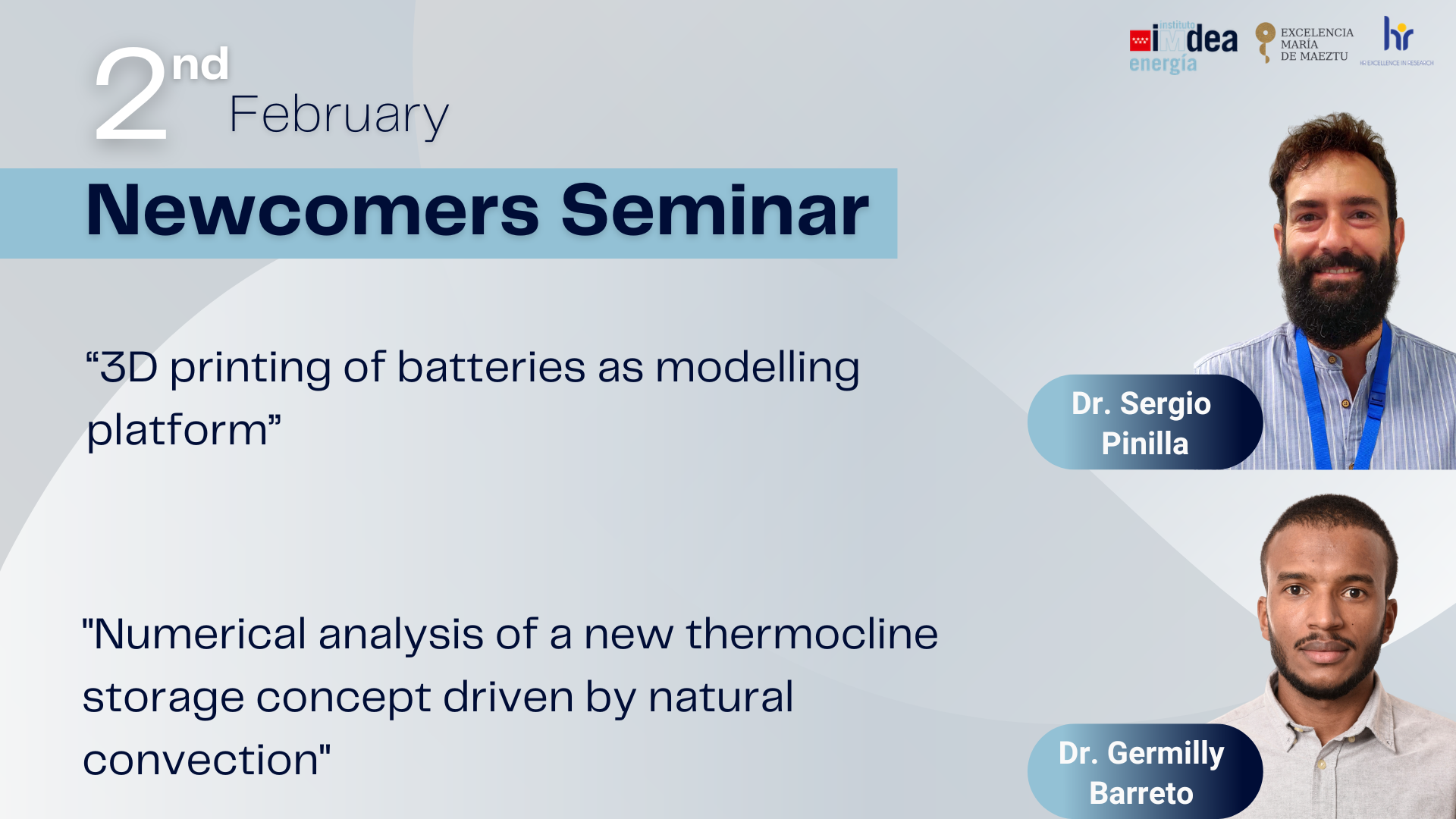Newcomers Seminar

Next February 2nd at 12 noon we will hold a new session of the seminar for newcomers in the auditorium.
The first speaker will be Dr. Sergio Pinilla , from the Electrochemical Processes Unit, with the talk entitle “3D printing of batteries as modelling platform».
The second one will be Dr. Germilly Barreto, from the High-Temperature Processes, with the talk “Numerical analysis of a new thermocline storage concept driven by natural convection».
Dr. Sergio Pinilla
Short Bio:
Sergio Pinilla is an MSCA research fellow at the Electrochemical Processes Unit, working in lithium-ion batteries and solid-state batteries. His interests lie in the optimization and modelling of the battery electrodes with special attention on the electrode microstructure and the electronic and ionic transport issues. He holds a PhD in Advanced Materials from the Universidad Autónoma de Madrid (2017) after which he did a stay at the Münster Electrochemical Energy Technology (MEET) (2018, Munster, Germany) and later he was awarded a Marie Curie fellowship to continue his research on batteries at Trinity College Dublin (2019, Dublin, Ireland). He joined IMDEA Energia in 2022 with a Marie Curie fellowship in the Energy for Future program and has been recently awarded an “Atracion de Talento” grant.
“3D printing of batteries as modelling platform”
Summary:
Currently, the electrochemical energy storage field is the central stage for the electrification of future transport, which is critical in the fight against climate change. Although Li-ion batteries have experienced substantial progress in the last years, they still lack the energy density and price required to make the electric vehicle (EV) the global choice for transportation. In this regard, solid-state batteries (SSBs) offer a substantial leap in performance, price and safety that makes them the preferred choice for the years to come. Still, SSBs are a novel technology with many challenges and their material selection, design and optimization are far from established. However, the current way of developing batteries is mainly based on trial-and-error processes, which are time-consuming, costly, and do not always lead to the best product design. This is why it becomes necessary a more rational optimization way based on a combination of theoretical and experimental work. In this regard, printed devices become a very powerful benchmarking tool where designs and properties can be systematically tuned to feed models.
Dr. Germilly Barreto
Short bio:
Germilly Barreto is a postdoctoral researcher at IMDEA Energy Institute at the unit of High-Temperature Processes since April 2022. He holds a PhD in Mechatronics Engineering and Energy (2020), MSc in Solar Energy Engineering (2015) and BSc in Renewable Energy Engineering (2013), all from the University of Évora, Portugal. His PhD thesis led him to be distinguished in 2020 by EUROTHERM Committee with the Young Scientist Award, an internationally recognized Award in the field of fundamental numerical modelling of fluid flow and heat transfer phenomena. After his PhD, he held a postdoctoral position for four months at University of Aveiro and for one year and half at the R&D group of the company ISQ – “Instituto de Soldadura e Qualidade” in Portugal. At IMDEA Energy he has been working in the development of different fundamental numerical models (CFD and simplified models) to investigate innovative technologies, namely thermal energy storage. All his research resulted in 7 papers in peer-reviewed international journals (six as first author) and 6 communications in congresses, which led him to receive 180 citations (excluding self-citations of all authors).
«Numerical analysis of a new thermocline storage concept driven by natural convection»
Summary:
Thermal energy can be stored under three principles: (i) sensible; (ii) latent and (iii) thermochemical. In concentrated solar power (CSP) applications, sensible storage is the most mature principle, commercially available and proven. The two-tanks molten-salt technology (sensible storage), is the most used and commercialized. Recently, the Italian National Agency for New Technologies, Energy and Sustainable Economic Development (ENEA), which we (IMDEA Energy) are collaborating with, proposed a new concept of a thermal energy storage system using molten-salt, where the traditional two-tanks is replaced by a single thermal stratified tank. The concept consists on having a single tank with molten-salt and two indirect heat exchangers (thermal oil to molten salt) inside the tank, one for charging and the other for discharging. This concept permits the formation of a stratified thermal tank (thermocline) using molten salt as storage medium. I will explain the concept, the technological challenges of this technology and introduce different numerical approaches (CFD and simplified models) I used to model this new thermocline concept.
El evento está terminado.
Fecha
- Feb 02 2023
- ¡Caducado!
Hora
- 12:00 - 13:00
Localización
- Auditorio IMDEA Energía


